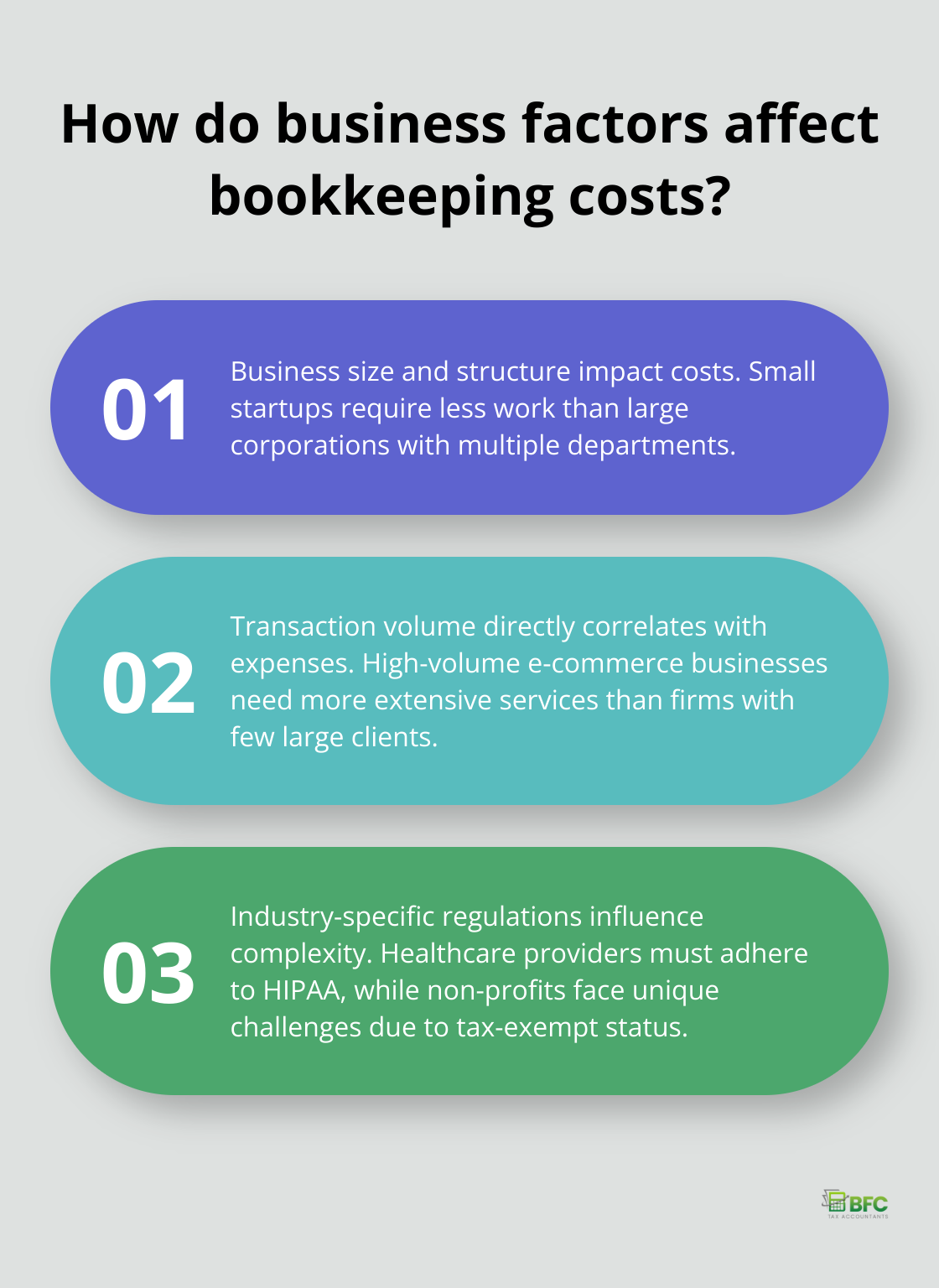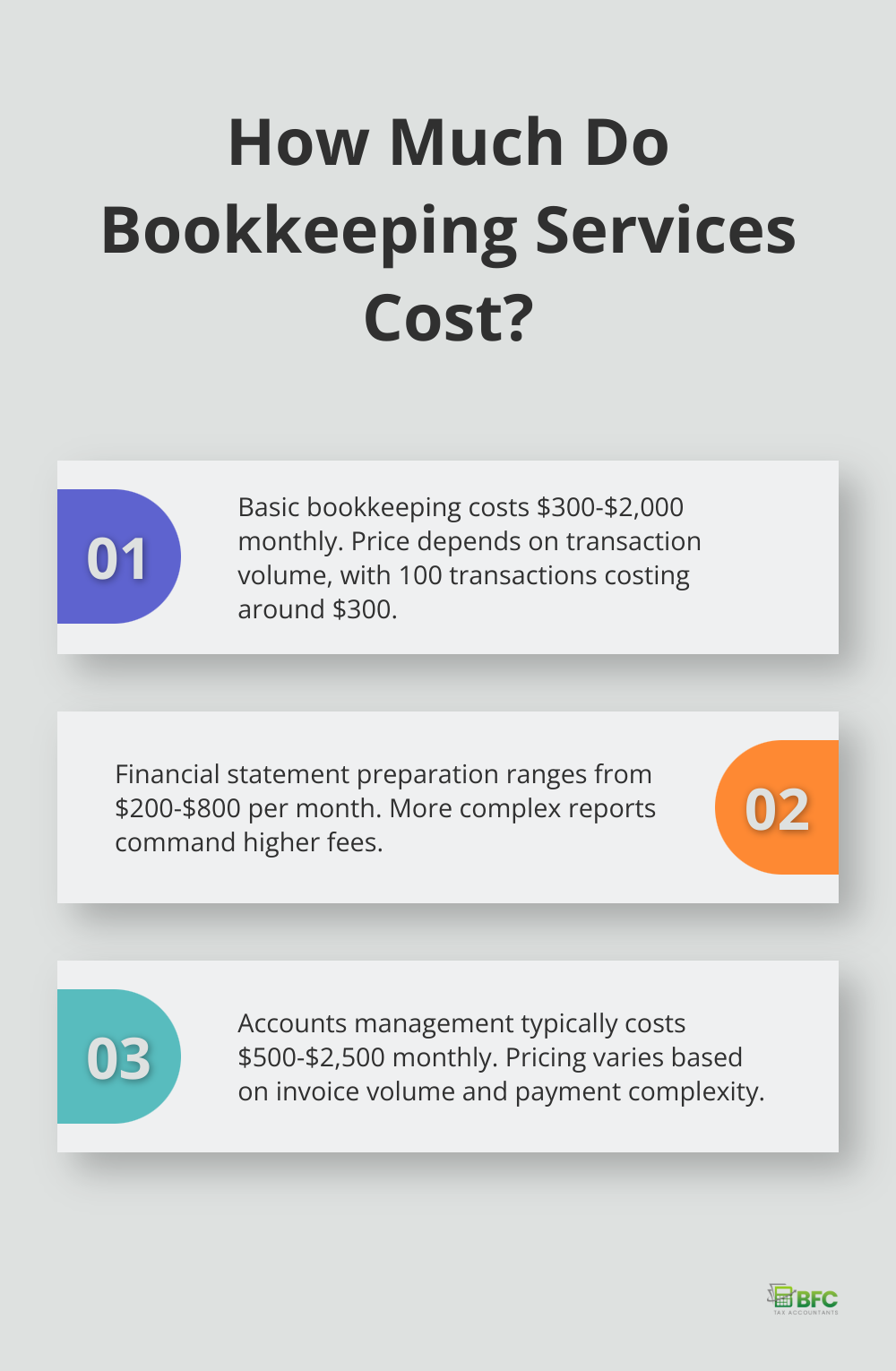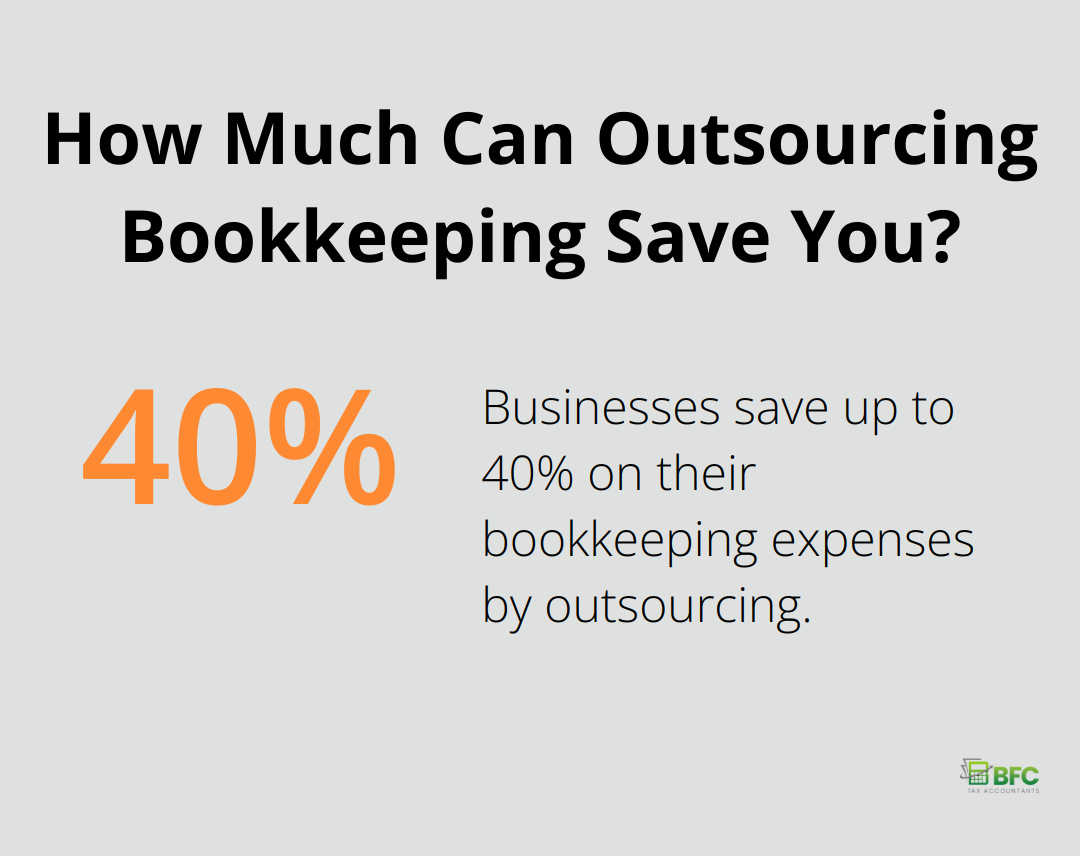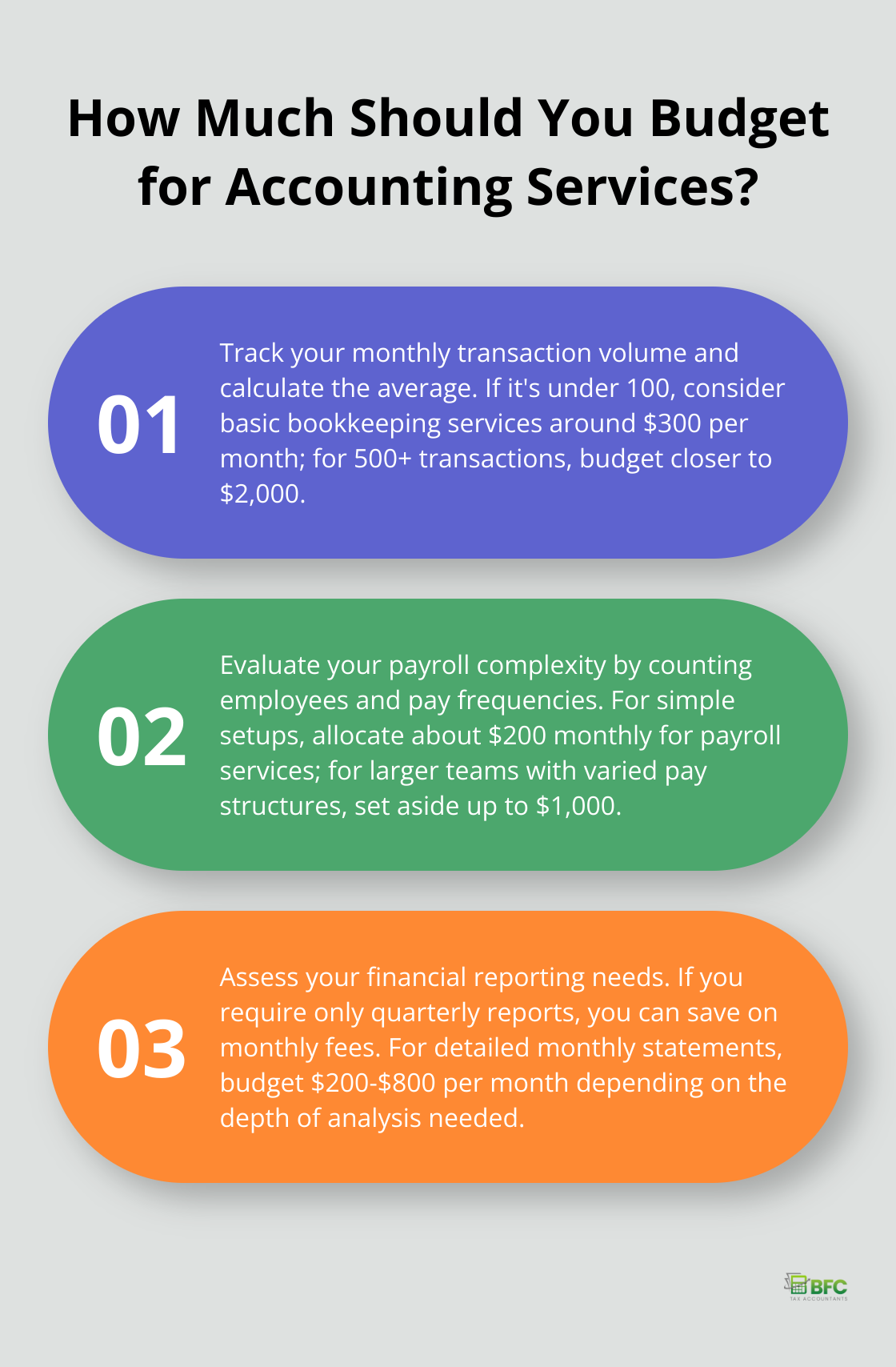At BFC Tax Accountants, we often hear the question: “How much do bookkeeping services cost?” The truth is there’s no one-size-fits-all answer.
Bookkeeping costs vary widely based on several factors, including your business size, transaction volume, and specific needs. Understanding these factors can help you make an informed decision about the right bookkeeping solution for your company.
In this post, we’ll break down the key elements that influence bookkeeping expenses and explore different service options to help you optimize your financial management.
What Drives Bookkeeping Costs?
Bookkeeping costs vary based on several key factors that directly impact the complexity and time required for financial management. Understanding these elements will help you anticipate and budget for your bookkeeping expenses more accurately.
Business Size and Structure
The size of your business significantly influences bookkeeping costs. A small startup with a handful of transactions will require less bookkeeping work than a large corporation with multiple departments and revenue streams.
Transaction Volume and Frequency
The number and frequency of financial transactions your business handles directly correlate with bookkeeping costs. A high-volume e-commerce business (processing hundreds of daily transactions) will require more extensive bookkeeping services than a consulting firm with a few large clients and monthly invoices.
Industry-Specific Requirements
Your industry can significantly impact bookkeeping costs due to specific regulations and compliance needs. For example, healthcare providers must adhere to strict HIPAA regulations, which adds layers of complexity to their financial management. Similarly, non-profit organizations face unique bookkeeping challenges due to their tax-exempt status and donor reporting requirements.
Technological Integration
The level of technology integration in your bookkeeping processes can affect costs. While initial setup of digital systems might increase upfront expenses, it often leads to long-term cost savings. Cloud-based accounting software (like QuickBooks or Xero) can streamline data entry and reporting, reducing manual labor and associated costs.
Frequency of Financial Reporting
How often you need financial reports can impact your bookkeeping costs. Businesses that require monthly detailed financial statements will incur higher costs than those that only need quarterly reports. The frequency of reporting affects the amount of time bookkeepers must spend organizing and analyzing financial data.

As we explore these cost factors, it’s important to consider how they apply to your specific business situation. Next, we’ll examine the various types of bookkeeping services available and their associated costs, helping you make an informed decision about the best financial management strategy for your company.
What Bookkeeping Services Cost
Bookkeeping services encompass various financial management tasks, each with its own price range. Let’s examine the typical services and their associated expenses.
Basic Bookkeeping and Data Entry
Basic bookkeeping forms the foundation of financial management. Costs for this service typically range from $300 to $2,000 per month. The price varies based on transaction volume and business complexity. A small business with fewer than 100 monthly transactions might pay closer to $300, while those handling 500+ transactions can expect higher fees.
Financial Statement Preparation
Monthly financial statements provide essential insights for decision-making. This service often costs between $200 and $800 per month. The price depends on the depth of reporting required. More complex reports or industry-specific analyses command higher fees.
Accounts Management
Accounts payable and receivable management is a time-intensive but necessary task. This service typically costs $500 to $2,500 monthly. The wide range accounts for variations in invoice volume and payment complexity. Businesses with numerous vendors or clients (e.g., large retail operations) fall on the higher end of this spectrum.
Payroll and Tax Services
Payroll processing and tax filing require specialized expertise. These services usually cost $200 to $1,000 per month. Factors influencing the price include the number of employees, payroll frequency, and tax situation complexity. Investing in professional services for these tasks often prevents costly errors.
Year-End Reporting
Year-end financial reporting and tax preparation involve more intensive work. This service is often billed separately from monthly tasks and can range from $1,000 to $5,000 or more. The final cost depends on business complexity and the level of support needed during tax season.

While these figures provide a general idea, every business has unique needs. Some bookkeeping firms (like BFC Tax Accountants) offer tailored packages to suit specific requirements and budgets. This approach ensures businesses don’t overpay for unnecessary services or underserve their financial management needs.
As we move forward, let’s explore the pros and cons of in-house versus outsourced bookkeeping to help you determine the most cost-effective solution for your business.
In-House vs. Outsourced Bookkeeping: A Cost-Benefit Analysis
Cost Comparison
Hiring a full-time in-house bookkeeper in Canada typically costs between $35,000 and $55,000 annually (according to PayScale data). This figure excludes additional expenses such as benefits, training, and software licenses. For small businesses, this represents a significant financial commitment.

Outsourced bookkeeping services often prove more cost-effective. Many businesses save up to 40% on their bookkeeping expenses by outsourcing. This reduction stems primarily from the elimination of full-time salary and benefits, as well as decreased overhead costs.
Expertise and Technology Access
Outsourcing to professional firms provides access to a team of experts with diverse skills. This breadth of knowledge proves particularly valuable for complex financial situations or industry-specific requirements.
Professional firms invest in advanced accounting software and stay updated with the latest financial regulations. Cloud-based systems allow real-time collaboration and data access (a feature that would be costly for many small businesses to implement independently).
Scalability and Flexibility
Business needs fluctuate, especially for seasonal industries or growing companies. Outsourced services offer the flexibility to scale up or down as needed. During tax season, for example, you might require more intensive services, while other months might need only basic bookkeeping.
An in-house bookkeeper’s capacity remains fixed, potentially leading to underutilization during slow periods or overwhelm during busy times. Many businesses appreciate the ability to adjust their service level without the complexities of hiring or laying off staff.
Industry-Specific Considerations
Some businesses (particularly those with highly sensitive financial information or unique industry requirements) might benefit from an in-house bookkeeper. However, for most small to medium-sized businesses, outsourced bookkeeping provides a cost-effective, flexible, and expert solution to financial management needs.
Time Management and Focus
Outsourcing bookkeeping allows business owners and managers to focus on core business activities. This shift in focus often leads to improved productivity and growth. In-house bookkeeping, while providing more direct control, can divert attention from strategic business operations.
Final Thoughts
Understanding how much bookkeeping services cost empowers businesses to make informed financial decisions. Several factors influence these costs, including business size, transaction volume, and industry requirements. Selecting the right bookkeeping approach impacts your business’s efficiency and growth, whether you choose in-house or outsourced services.

At BFC Tax Accountants, we understand the unique financial challenges faced by businesses in Barrie, Ontario and beyond. Our team of expert accountants at BFC Tax Accountants offers tailored bookkeeping solutions designed to optimize your financial processes. We provide scalable services that grow with your business, from basic data entry to comprehensive financial reporting.
Professional bookkeepers offer access to advanced accounting technologies and industry-specific expertise. This approach helps control costs and ensures compliance with Canadian tax laws. Effective bookkeeping supports your financial health and drives long-term success, so let BFC Tax Accountants help you navigate your bookkeeping needs.

